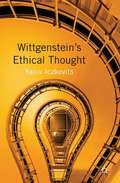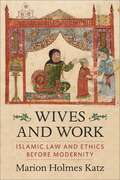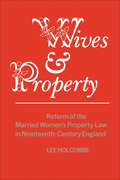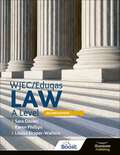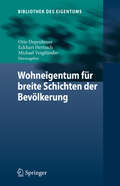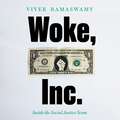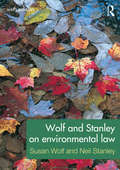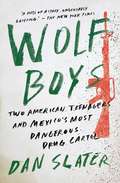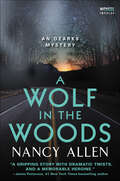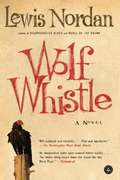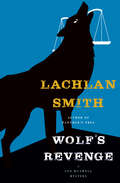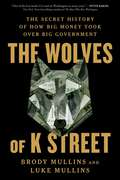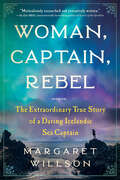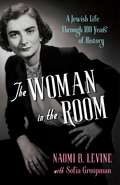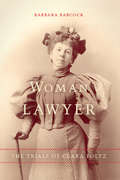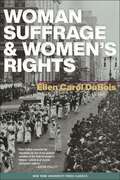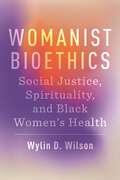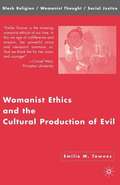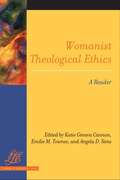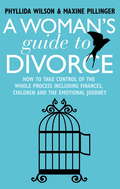- Table View
- List View
Wittgenstein and the Creativity of Language
by Sebastian Sunday Grève Jakub MáchaThis volume is the first to focus on a particular complex of questions that have troubled Wittgenstein scholarship since its very beginnings. The authors re-examine Wittgenstein’s fundamental insights into the workings of human linguistic behaviour, its creative extensions and its philosophical capabilities, as well as his creative use of language. It offers insight into a variety of topics including painting, politics, literature, poetry, literary theory, mathematics, philosophy of language, aesthetics and philosophical methodology.
Wittgenstein’s Ethical Thought
by Yaniv IczkovitsExploring the ethical dimension of Wittgenstein's thought, Iczkovits challenges the view that Wittgenstein had a vision of language and subsequently a vision of ethics, showing how the two are integrated in his philosophical method, and allowing us to reframe traditional problems in moral philosophy considered as external to questions of meaning.
Wittgenstein’s Moral Thought (Routledge Studies in Ethics and Moral Theory)
by Reshef Agam-Segal Edmund DainWittgenstein’s work, early and later, contains the seeds of an original and important rethinking of moral or ethical thought that has, so far, yet to be fully appreciated. The ten essays in this collection, all specially commissioned for this volume, are united in the claim that Wittgenstein’s thought has much to contribute to our understanding of this fundamental area of philosophy and of our lives. They take up a variety of different perspectives on this aspect of Wittgenstein’s work, and explore the significance of Wittgenstein’s moral thought throughout his work, from the Tractatus Logico-Philosophicus, and Wittgenstein’s startling claim there that there can be no ethical propositions, to the Philosophical Investigations.
Wives and Work: Islamic Law and Ethics Before Modernity
by Marion Holmes KatzIt is widely held today that classical Islamic law frees wives from any obligation to do housework. Wives’ purported exemption from domestic labor became a talking point among Muslims responding to Orientalist stereotypes of the “oppressed Muslim woman” by the late nineteenth century, and it has been a prominent motif in writings by Muslim feminists in the United States since the 1980s.In Wives and Work, Marion Holmes Katz offers a new account of debates on wives’ domestic labor that recasts the historical relationship between Islamic law and ethics. She reconstructs a complex discussion among Sunni legal scholars of the ninth to fourteenth centuries CE and examines its wide-ranging implications. As early as the ninth century, the prevalent doctrine that wives had no legal duty to do housework stood in conflict with what most scholars understood to be morally and religiously right. Scholars’ efforts to resolve this tension ranged widely, from drawing a clear distinction between legal claims and ethical ideals to seeking a synthesis of the two. Katz positions legal discussion within a larger landscape of Islamic normative discourse, emphasizing how legal models diverge from, but can sometimes be informed by, philosophical ethics. Through the lens of wives’ domestic labor, this book sheds new light on notions of family, labor, and gendered personhood as well as the interplay between legal and ethical doctrines in Islamic thought.
Wives & Property: Reform of the Married Women's Property Law in Nineteenth-Century England
by Lee HolcombeIn the 1870s Millicent Garrett Fawcett had her purse snatched by a young thief in London. When he appeared in court to testify, she heard the young man charged with 'stealing from the person of Millicent Fawcett a purse containing £1 18s 6d the property of Henry Fawcett.' Long after the episode she recalled: 'I felt as if I had been charged with theft myself.' The English common law which deprived married women of the right to own and control property had far-reaching consequences for the status of women not only in other areas of law and in family life but also in education, and employment, and public life. To win reform of the married women's property law, feminism as an organized movement appeared in the 1850s, and the final success of the campaigns for reform in 1882 was one of the greatest achievements of the Victorian women's movement. Dr Holcombe explores the story of the reform campaign in the context of its time, giving particular attention to the many important men and women who worked for reform and to the debates on the subject which contributed greatly to the formulation of a philosophy of feminism.
WJEC/Eduqas Law A Level: Second Edition
by Sara Davies Karen Phillips Louisa Draper-WaltersWritten by experienced Law teachers and examiners, this comprehensive student book has been revised and updated to reflect the latest changes in the law. With up-to-date case examples, extensive exam support and a variety of useful features, it offers high quality support for the WJEC and Eduqas A Level Law courses.- Designed for both the WJEC and Eduqas specifications, each topic is mapped to the relevant specifications for quick reference and easy navigation.- Covers all the content of the AS and A Level courses in a single student-friendly book.- Includes comprehensive exam support, with updated exam questions supported by detailed guidance and answers available online.- A variety of features, including Grade Boost, Key Cases and Stretch and Challenge activities encourage students to think critically and help develop their knowledge and understanding and ability to analyse.- An Exam practice and technique section provides advice and guidance on how to revise and helps develop the skills needed for the exams.
Wohin führt uns die Wissenschaft?: Und was wir tun können, um sie zu lenken
by Lars Jaeger Michel DacorognaIn den letzten 60 Jahren hat sich die Welt radikal gewandelt, angetrieben von bahnbrechenden Fortschritten in Wissenschaft und Technologie. Von den 1960ern bis heute erlebten wir einen beispiellosen Anstieg unseres Wissens in Bereichen wie Physik, Chemie, Biologie, Medizin, Computerwissenschaften und virtuelle Realitäten. Dies führte zur Entwicklung von wegweisenden Technologien wie Personalcomputern, dem Internet, Multitasking-Handys und fortschrittlicher künstlicher Intelligenz. Die Wissenschaft wurde dezentralisiert, und globale Forschergruppen arbeiten an komplexen Problemen, die unser Leben exponentiell beeinflussen. Unsere Welt verändert sich nicht mehr durch Einzeltechnologien, sondern durch die gleichzeitige Entwicklung verschiedener Technologien innerhalb weniger Jahre. Trotz des Wohlstands brachten Wissenschaft und Technologie auch neue globale Risiken mit sich. Atomkraft für das Militär, aufkommende künstliche Intelligenz, genetische Veränderungen und die Kontrolle durch Technologieunternehmen sind Herausforderungen, die unsere Zukunft prägen. Insgesamt hat der Fortschritt der letzten 60 Jahre unsere Welt transformiert und uns vor Chancen und Herausforderungen gestellt, die eine sorgfältige und ethische Gestaltung unserer Zukunft erfordern.
Wohneigentum für breite Schichten der Bevölkerung (Bibliothek des Eigentums #18)
by Otto Depenheuer Eckhart Hertzsch Michael VoigtländerIn der wohnungspolitischen Debatte steht meist der Mietwohnungsmarkt im Vordergrund, dabei bietet das Wohneigentum gerade auch für Haushalte mit geringeren Einkommen vielfältige Möglichkeiten. Sei es die Vermeidung jahrelanger Mietzahlungen, die Stabilität gleichbleibender Kreditzahlungen, die Sicherheit, dass niemand Eigenbedarf anmelden kann, oder die Vorsorge für das Alter; all dies sind Beweggründe hin zum Eigentum. Kosten und Vermögensbildung wie auch länderspezifische und bundespolitische Instrumente, werden – neben vielen anderen Aspekten – in diesem Buch von namhaften Autorinnen und Autoren diskutiert. Beispiele erfolgsversprechender Lösungen werden aufgezeigt, die den Zugang zu Wohneigentum für breite Schichten der Bevölkerung erleichtern sollen.
Wohnungseigentumsrecht für Dummies (Für Dummies)
by Ulrich AdamWenn Sie bereits Wohnungseigentum besitzen oder darüber nachdenken, sich welches zuzulegen, dann sollten Sie über Ihre Rechte und Pflichten möglichst gut Bescheid wissen. Wohnungseigentumsrecht ist nicht schwierig. Der spezialisierte Rechtsanwalt und Fachanwalt Dr. Ulrich Adam erklärt Ihnen in diesem Buch Schritt für Schritt mit vielen Übersichten und Beispielen alles, was Sie darüber wissen sollten. Die umfassenden Änderungen der Reform 2020 sind in der 2. Auflage bereits vollständig in den Text eingearbeitet. Zahlreiche Abbildungen, Checklisten und Beschlussvorlagen erleichtern Ihnen Ihr Leben als Wohnungseigentümer. Erfahren Sie alles über Verwaltung, bauliche Änderungen, Eigentümerversammlung, Beschlussanfechtung, Jahresabrechnung und vieles andere mehr - und das immer einfach lesbar, verständlich und humorvoll. Damit sind Sie als Wohnungseigentümer für die nächste Eigentümerversammlung bestens ausgestattet!
Woke, Inc.: A Sunday Times Business Book of the Year
by Vivek RamaswamyA young entrepreneur makes the case that politics has no place in business, and sets out a new vision for the future of capitalism.The modern woke-industrial complex divides us as a people. By mixing morality with consumerism, corporate elites prey on our innermost insecurities about who we really are. They sell us cheap social causes and skin-deep identities to satisfy our hunger for a cause and our search for meaning, at a moment when we lack both.Vivek Ramaswamy is a traitor to his class. He's founded multibillion-dollar enterprises, led a biotech company as CEO, trained as a scientist at Harvard and a lawyer at Yale, and grew up the child of immigrants in a small town in Ohio. Now he takes us behind the scenes into corporate boardrooms and five-star conferences, into Ivy League classrooms and secretive nonprofits, to reveal the defining scam of our century.But this book not only rips back the curtain on the new corporatist agenda, it offers a better way forward. Corporate elites may want to sort us into demographic boxes, but we don't have to stay there. Woke, Inc. begins as a critique of stakeholder capitalism and ends with an exploration of what it means to be a member of society in 2021 - a journey that begins with cynicism and ends with hope.
Wolf and Stanley on Environmental Law
by Susan Wolf Neil StanleyWritten with real clarity by authors teaching and researching in the field, Wolf and Stanley on Environmental Law offers an excellent starting point for both law and non-law students encountering this diverse and controversial subject for the first time. Topics covered include administration and enforcement, waste management, EU environmental law, pollution control, environmental permitting, contaminated land, environmental torts and private regulation. The book is supported by a range of learning features designed to help students: Consolidate your learning: Chapter learning objectives and detailed summaries clarify and highlight key points Understand how the law works in practice: ‘Law in Action’ features demonstrate the application of pollution control law Plan your research: Detailed end of chapter further reading sections outline articles, books and online resources that provide next steps for your research This sixth edition has been updated and revised to take into account recent developments in the subject, including coverage of the Environmental Permitting (England and Wales) Regulations 2010; developments in the Environment Agency enforcement and sanctions policy documents; and updates relating to the defence of statutory authority in the tort of private nuisance. Suitable for students of environmental law and the wider environmental studies, Wolf and Stanley on Environmental Law is a valuable guide to this wide-ranging subject. Susan Wolf is Principal Lecturer in Law at the University of Northumbria. Neil Stanley is Lecturer in Law at the University of Leeds.
Wolf Boys: Two American Teenagers and Mexico's Most Dangerous Drug Cartel
by Dan SlaterThe tale of two American teenagers recruited as killers for a Mexican cartel, and the Mexican American detective who realizes the War on Drugs is unstoppable. &“A hell of a story…undeniably gripping.&” (The New York Times)In this astonishing story, journalist Dan Slater recounts the unforgettable odyssey of Gabriel Cardona. At first glance, Gabriel is the poster-boy American teenager: athletic, bright, handsome, and charismatic. But the ghettos of Laredo, Texas—his border town—are full of smugglers and gangsters and patrolled by one of the largest law-enforcement complexes in the world. It isn’t long before Gabriel abandons his promising future for the allure of juvenile crime, which leads him across the river to Mexico’s most dangerous drug cartel: Los Zetas. Friends from his childhood join him and eventually they catch the eye of the cartel’s leadership. As the cartel wars spill over the border, Gabriel and his crew are sent to the States to work. But in Texas, the teen hit men encounter a Mexican-born homicide detective determined to keep cartel violence out of his adopted country. Detective Robert Garcia’s pursuit of the boys puts him face-to-face with the urgent consequences and new security threats of a drug war he sees as unwinnable. In Wolf Boys, Slater takes readers on a harrowing, often brutal journey into the heart of the Mexican drug trade. Ultimately though, Wolf Boys is the intimate story of the lobos: teens turned into pawns for the cartels. A nonfiction thriller, it reads with the emotional clarity of a great novel, yet offers its revelations through extraordinary reporting.
A Wolf in the Woods: An Ozarks Mystery (Ozarks Mysteries #4)
by Nancy Allen“A gripping story with dramatic twists, and a memorable heroine.” —James Patterson, #1 New York Times bestselling authorMcCown County assistant prosecutor Elsie Arnold is prepping an assault case when a girl is found beaten and bloodied at a roadside no-tell motel. Elsie tries to convince the teen to reveal who attacked her, but Mandy is too scared—and stubborn—to cooperate… and then she disappears. Elsie’s positive a predator is targeting the Ozark hills, yet the authorities refuse to believe their small town could be plagued by sex trafficking.Then middle school student Desiree Wickham goes missing, but only Elsie suspects it could be connected to Mandy’s assault. As she digs deeper into the events leading up to Desiree’s disappearance, she stumbles upon an alarming discovery: local girls are falling prey to a dubious online modeling agency, and never seen again. Elsie shares her concerns with Detective Ashlock and the FBI, but they shut her out. She takes matters into her own hands and lands an interview with the head of the modeling agency. But when she meets him face-to-face, she discovers the fate of Desiree and Mandy… and becomes his newest captive. Elsie’s desperate to free the girls—and save herself—before the unspeakable happens. And she’s in for the fight of her life.
Wolf Whistle: A Novel
by Lewis NordanLewis Nordan unleashes the hellhounds of his prodigious imagination on one of the most notorious racial killings of the century, the Emmett Till murder. Soon we're on a magical mystery tour of the Southern psyche of the mid-1950s.
Wolfenden's Witnesses: Homosexuality in Postwar Britain (Genders And Sexualities In History)
by Brian LewisThe Wolfenden Report of 1957 has long been recognized as a landmark in moves towards gay law reform. What is less well known is that the testimonials and written statements of the witnesses before the Wolfenden Committee provide by far the most complete and extensive array of perspectives we have on how homosexuality was understood in mid-twentieth century Britain. Those giving evidence, individually or through their professional associations, included a broad cross-section of official, professional and bureaucratic Britain: police chiefs, policemen, magistrates, judges, lawyers and Home Office civil servants; doctors, biologists (including Alfred Kinsey), psychiatrists, psychoanalysts and psychotherapists; prison governors, medical officers and probation officers; representatives of the churches, morality councils and progressive and ethical societies; approved school headteachers and youth organization leaders; representatives of the army, navy and air force; and a small handful of self-described but largely anonymous homosexuals. This volume presents an annotated selection of their voices.
Wolf's Revenge (The Leo Maxwell Mysteries #5)
by Lachlan Smith“Full of revelations, surprises and shocks,” the fifth Leo Maxwell mystery pits the underdog defense attorney against an unforgiving prison gang (Bookreporter). Lachlan Smith’s Shamus Award–winning series continues with attorney-detective Leo Maxwell seeking an exit strategy from his family’s deepening entanglement with a ruthless prison-based gang. Caught between the criminals and the FBI, Leo charts his own path in defending a young woman who was manipulated into brazenly murdering a member of the Aryan Brotherhood in San Francisco’s Tenderloin neighborhood. When the consequences strike heartbreakingly close to home, Leo, his brother Teddy, and the rest of the family are forced into a winner-takes-all confrontation with men who don’t care how many innocents they harm in achieving their goals. As Leo’s world collapses, long-held secrets are revealed, transforming his perspective on the aftermath of the tragedy that derailed his childhood and fractured his family twenty-one years ago. The question then becomes who will get revenge first—the Maxwells or the sadistic gang leader who pursues them? “In its complexity, Wolf’s Revenge might remind a reader of a John le Carré novel; few are who they seem to be. Spies and double agents abound. This novel has action, some violence, but its real strengths are its intricacy and some rather dispiriting revelations about our criminal justice system.” —Tuscaloosa News “Operating at the top of his game, Smith is as good as anyone writing today at combining a mystery with the overlay of existential dread that noir fans relish.” —Publishers Weekly (starred review)
The Wolves of K Street: The Secret History of How Big Money Took Over Big Government
by Brody Mullins Luke MullinsA dazzling and infuriating portrait of fifty years of corporate influence in Washington, The Wolves of K Street is a &“not-so-guilty pleasure&” (The New York Times): irresistibly dramatic, spectacularly timely, explosive in its revelations, and impossible to put down.In the 1970s, Washington&’s center of power began to shift away from elected officials in big marble buildings to a handful of savvy, handsomely paid operators who didn&’t answer to any fixed constituency. The cigar-chomping son of an influential congressman, an illustrious political fixer with a weakness for modern art, a Watergate-era dirty trickster, the city&’s favorite cocktail party host—these were the sort of men who now ran Washington. Over four decades, they&’d chart new ways to turn their clients&’ cash into political leverage, abandoning favor-trading in smoke-filled rooms for increasingly sophisticated tactics, such as &“shadow lobbying,&” where underground campaigns sparked seemingly organic public outcries to pressure lawmakers into taking actions that would ultimately benefit corporate interests rather than ordinary citizens. With billions of dollars at play, these lobbying dynasties enshrined in Washington a pro-business consensus that would guide the country&’s political leaders—Democrats and Republicans alike. A good lobbyist could ghostwrite a bill or even secretly kill a piece of legislation supported by the president, both houses of Congress, and a majority of Americans. Yet nothing lasts forever. Amid a populist backlash to the soaring inequality these influence peddlers helped usher in, DC&’s pro-business alliance suddenly began to fray. And while the lobbying establishment would continue to invent new ways to influence Washington, the men who&’d built K Street would soon find themselves under legal scrutiny, on the verge of financial collapse or worse. One would turn up dead behind the eighteenth green of an exclusive golf club, with a $1,500 bottle of wine at his feed and bullet in his head. An &“absorbing&” (The Atlantic), &“engrossing&” and &“meticulously researched&” tale (The Guardian)—brought to life with &“novelistic detail&” and &“considerable narrative skill&” (The New York Times)—The Wolves of K Street is essential reading for anyone looking to understand how corporate interests are undermining American democracy.
Woman, Captain, Rebel: The Extraordinary True Story of a Daring Icelandic Sea Captain
by Margaret WillsonA daring and magnificent historical narrative nonfiction account of Iceland's most famous female sea captain who constantly fought for women's rights and equality—and who also solved one of the country's most notorious robberies.Every day was a fight for survival, equality, and justice for Iceland's most renowned female fishing captain of the 19th century.History would have us believe the sea has always been a male realm, the idea of female captains almost unthinkable. But there is one exception, so notable she defies any expectation.This is her remarkable story.Captain Thurídur, born in Iceland in 1777, lived a life that was both controversial and unconventional. Her first time fishing, on the open unprotected rowboats of her time, was at age 11. Soon after, she audaciously began wearing trousers. She later became an acclaimed fishing captain brilliant at weather-reading and seacraft and consistently brought in the largest catches. In the Arctic seas where drownings occurred with terrifying regularity, she never lost a single crewmember. Renowned for her acute powers of observation, she also solved a notorious crime. In this extremely unequal society, she used the courts to fight for justice for the abused, and in her sixties, embarked on perilous journeys over trackless mountains.Weaving together fastidious research and captivating prose, Margaret Willson reveals Captain Thurídur's fascinating story, her extraordinary courage, intelligence, and personal integrity.Through adventure, oppression, joy, betrayal, and grief, Captain Thurídur speaks a universal voice. Here is a woman so ahead of her times she remains modern and inspirational today. Her story can now finally be told.Praise for Woman, Captain, Rebel:"Meticulously researched and evocatively written, Woman, Captain, Rebel provides not only a captivating insight into 19th-century Iceland, but also introduces readers to the inspirational, real-life fishing captain Thurídur, a tough and fiercely independent woman who deserves to be a role model of determination and perseverance for us all." —Eliza Reid, internationally bestselling author of Secrets of the Sprakkar"A crime has been committed in 19th century Iceland and in steps a mysterious seawoman moonlighting as a detective, dressed in male clothes. Margaret Willson unravels this legendary casework of Captain Thurídur, down to the finest detail, with a brilliant portrait of old Iceland by the sea." —Egill Bjarnason, author of How Iceland Changed the World"Reading about this remarkable woman's journey will challenge your ideas about history and change yours too." —Major General Mari K. Eder, author of The Girls Who Stepped Out of Line"All credit to Margaret Willson for excavating the story of Thurídur Einarsdóttir in a century which can at long last appreciate this feisty and resilient Icelandic seafarer. The meticulous research is worn so lightly that it reads like a saga." —Sally Magnusson, author and broadcaster"A beautiful story of one woman's perseverance against tragedy, hardship, and the open seas." —Katharine Gregorio, author of The Double Life of Katharine Clark"With a clear, compelling narrative voice, Willson illuminates the life of an extraordinary woman and brings rural Iceland to life for her readers." —Shelf Awareness
The Woman in the Room: A Jewish Life Through 100 Years of History
by Naomi B. Levine Sofia GroopmanBorn into a poor, immigrant family, Naomi B. Levine grew up in the Bronx and on Manhattan’s storied Lower East Side in an era when women were not encouraged to have lives of their own. Nevertheless, she managed to raise herself to prominence as a leader of Jewish affairs, champion of civil rights, and expert fundraiser.Poignant, direct, and inflected with Yiddishkeit, The Woman in the Room is the story of how Levine went from living in a crowded tenement with a shared bathroom to penning an amicus brief that was crucial in Brown v. Board of Education, assuming the Executive Directorship of the American Jewish Congress, and saving NYU from bankruptcy with the first billion-dollar capital campaign for a university.A lover of history, Levine describes not just her life but also articulates how the major historical events of the time emboldened her to take social and political positions that were in many circles unacceptable. She was an activist and a feminist before those concepts became part of our everyday parlance. The Woman in the Room not only illuminates the decades Levine lived but furnishes future generations with the strength and courage to face the challenges before them.
Woman Lawyer
by Barbara BabcockWoman Lawyertells the story of Clara Foltz, the first woman admitted to the California Bar. Famous in her time as a public intellectual, leader of the women's movement, and legal reformer, Foltz faced terrific prejudice and well-organized opposition to women lawyers as she tried cases in front of all-male juries, raised five children as a single mother, and stumped for political candidates. She was the first to propose the creation of a public defender to balance the public prosecutor. Woman Lawyeruncovers the legal reforms and societal contributions of a woman celebrated in her day, but lost to history until now. It casts new light on the turbulent history and politics of California in a period of phenomenal growth and highlights the interconnection of the suffragists and other movements for civil rights and legal reforms.
Woman Suffrage and Women’s Rights
by Ellen Carol DuBoisAn essential examination of the woman suffrage movementIn recent decades, the woman suffrage movement has taken on new significance for women's history. Ellen Carol DuBois has been a central figure in spurring renewed interest in woman suffrage and in realigning the debates which surround it. This volume gathers DuBois' most influential articles on woman suffrage and includes two new essays. The collection traces the trajectory of the suffrage story against the backdrop of changing attitudes to politics, citizenship and gender, and the resultant tensions over such issues as slavery and abolitionism, sexuality and religion, and class and politics. Connecting the essays is DuBois' belief in the continuing importance of political and reform movements as an object of historical inquiry and a force in shaping gender. The book, which includes a highly original reconceptualization of women's rights from Mary Wollstonecraft to contemporary abortion and gay rights activists and a historiographical overview of suffrage scholarship, provides an excellent overview of the movement, including international as well as U.S. suffragism, in the context of women's broader concerns for social and political justice.
Womanist Bioethics: Social Justice, Spirituality, and Black Women's Health (Religion and Social Transformation)
by Wylin D. WilsonOffers Bioethics a bold approach to redress its failing of Black womenBlack people, and especially Black women, suffer and die from diseases at much higher rates than their white counterparts. The vast majority of these health disparities are not attributed to behavioral differences or biology, but to the pervasive devaluation of Black bodies.Womanist Bioethics addresses this crisis from a bioethical standpoint. It offers a critique of mainstream bioethics as having embraced the perspective of its mainly white, male progenitors, limiting the extent to which it is positioned to engage the issues that particularly affect vulnerable populations. This book makes the provocative but essential case that because African American women– across almost every health indicator– fare worse than others. We must not only include, but center, Black women’s experiences and voices in bioethics discourse and practice.To this end, Womanist Bioethics develops the first specifically womanist form of bioethics, focused on the diverse vulnerabilities and multiple oppressions that women of color face. This innovative womanist bioethics is grounded in the Black Christian prophetic tradition, based on the ideas that God does not condone oppression and that it is imperative to defend those who are vulnerable. It also draws on womanist theology and Black liberation theology, which take similar stances. At its core, the volume offers a new, broad-based approach to bioethics that is meant as a corrective to mainstream bioethics’ privileging of white, particularly male, experiences, and it outlines ways in which hospitals, churches, and the larger community can better respond to the healthcare needs of Black women.
Womanist Ethics and the Cultural Production of Evil
by Emilie M. TownesThis groundbreaking book provides an analytical tool to understand how and why evil works in the world as it does. Deconstructing memory, history, and myth as received wisdom, the volume critically examines racism, sexism, poverty, and stereotypes.
Womanist Theological Ethics: A Reader
by Katie Geneva Cannon Emilie M. Townes Angela D. SimsIn this new volume in the Library of Theological Ethics series, nine African American women scholars reflect on what it means to live as responsible doers of justice. This book presents analytical strategies for understanding the story of womanist scholarship in the service of the Black community.
A Woman's Guide to Divorce: How to take control of the whole process, including finances, children and the emotional journey
by Phyllida Wilson Maxine PillingerThis book will inform and empower women who have decided to divorce, or are deciding whether to do so.It will give them the `heads up` on what to expect, and the confidence to manage and control the formidable process; from the first meeting with a solicitor to the financial implications, the court processes, communication with the `ex`, and managing children, family and friends.It offers guidance on living arrangements and emotional aspects, and on the characteristics of `extreme` divorces including violence, harassment, custody battles, non-compliance and aggressive financial deprivation.
